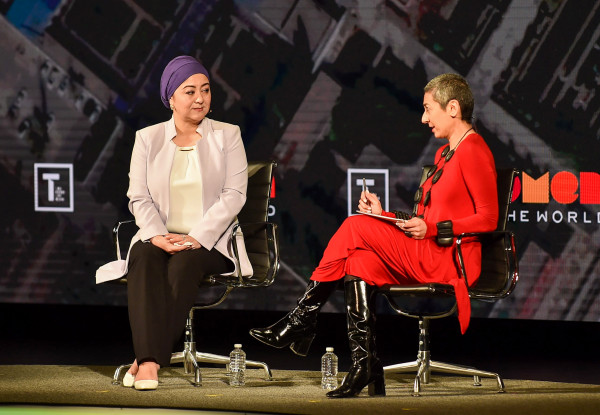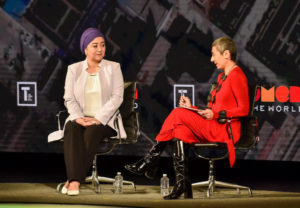Her image is banned in China, but she’s showing her face to the world
 Gulchehra Hoja, Uyghur Journalist, Radio Free Asia and Zainab Salbi, Author and Founder, Women for Women International, ‘CHINA’S SHAME’ at The 2019 Women In The World Summit in New York City; 4/11/2019
Gulchehra Hoja, Uyghur Journalist, Radio Free Asia and Zainab Salbi, Author and Founder, Women for Women International, ‘CHINA’S SHAME’ at The 2019 Women In The World Summit in New York City; 4/11/2019
Women In The World, 11 April 2019

By Lance Richardson – Life used to look very different for the Muslim-majority Uyghur people in the Xinjiang territory of northwest China. There were Uyghur schools with Uyghur teachers, proudly passing on language and traditions to the next generation. Many of the buildings exhibited Uyghur architecture: A museum, for instance, looked like a mosque.
But then the Chinese government began forcing children to follow a Han Chinese education. Uyghur buildings were demolished, and in the early 1990s, the Uyghur language was outlawed in universities, then high schools, then middle schools, then elementary schools. Young children were taught to speak Mandarin instead. Uyghurs were put to work in Chinese factories. In 2009, mounting tensions between Muslim Uyghurs and Han Chinese led to violent rioting that left at least 140 dead.
Today Xinjiang is akin to a 21st-century police state. In December 2018, a member of the United States Senate Committee on Foreign Relations asserted that at least 800,000 Uyghurs, and possibly more than 2 million, have been detained in “internment camps,” though the Chinese government prefers to call them “vocational education centers.” This represents the largest mass incarceration of an ethnic minority anywhere in the world.
“In the internment camps, millions of Uyghurs — millions of Uyghur women, just like us — struggle just to exist today,” Gulchehra Hoja, a Uyghur journalist for Radio Free Asia told Zainab Salbi, before a silent audience at the 10th annual Women in the World Summit on Thursday. This struggle was, for Hoja, deeply personal: Twenty-four members of her family currently live in those camps, and just appearing onstage to highlight the plight of her people put them “in danger” of further persecution, she said.
Hoja had once been a prominent figure on Uyghur television for children. When Chinese authorities pressured her to propagandize for the Communist Party, she began speaking out internationally. The government responded by banning her image. Eventually, they came after her family, starting with her brother in September 2017. “I was silent, because my mom asked me to be silent,” Hoja recalled. Her mother was hoping that silence would secure his release. It did not and, in February 2018, the pressure was only increased: “I heard my mom and my other cousin, my aunts, two dozen people rounded up, sent to camp, just because of me. So I couldn’t just keep silent. I make my decision to speak up to the whole world.”
Women are very important in Uyghur society, Hoja continued. Tradition says that they rock a cradle with their left hand; they rock the world with the right. “Today, when our people struggle just to exist — this is the day, this is the time, that we have to be true women, to rock the world.”
Following Hoja’s example, and with her help, other Uyghur women have tried to do exactly that. Mihrigul Tursun, a young refugee with two children, has recently been vocal about abuse in Xinjiang camps. Tursun blames Chinese authorities for the death of her third son, Mohaned.
As Hoja spoke with emotion onstage, sporting a hijab that she chooses to wear as a symbol of defiance, and calling on the audience to “stand up” with her in solidarity, a statement was released by Rebiya Kadeer, an exiled Uyghur National Movement leader: “[Hoja] is a freedom fighter and brave member of our people … I believe her presence is a little comfort to millions of Uyghur women and children who are separated from their loved ones and detained in re-education camps or orphanages.”
Additional reporting by Gloria Teal.
https://blogs.timesofisrael.com/jews-must-speak-up-for-the-uyghurs-in-china/

